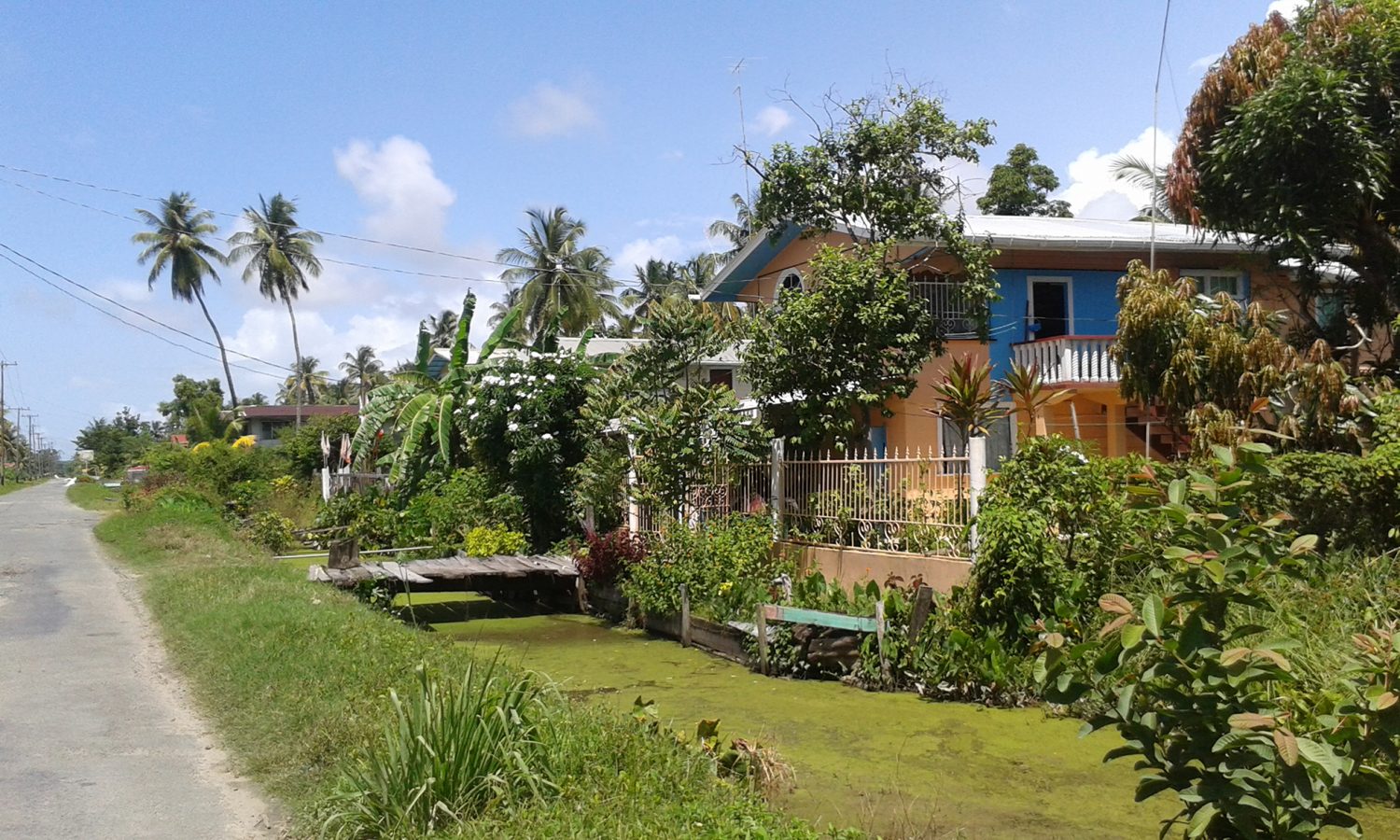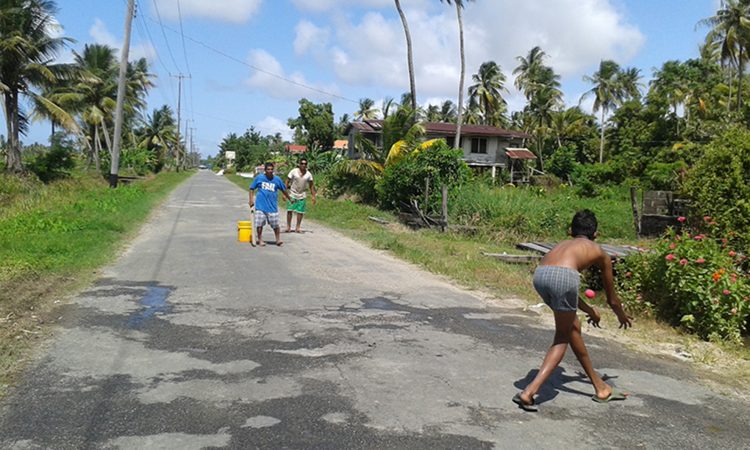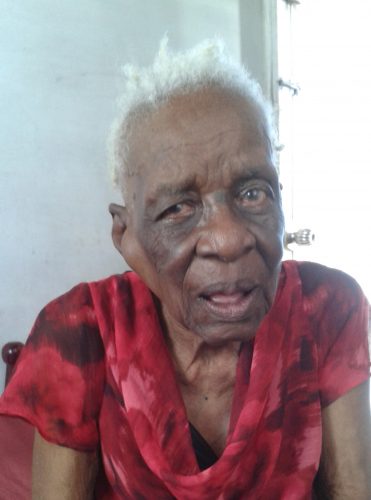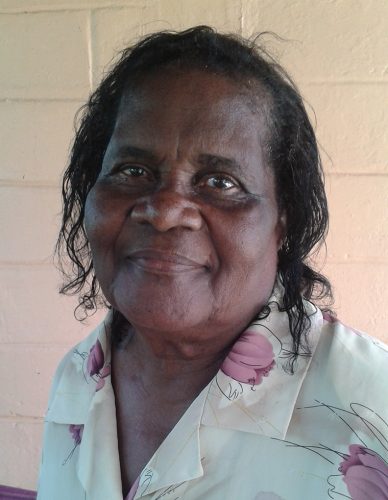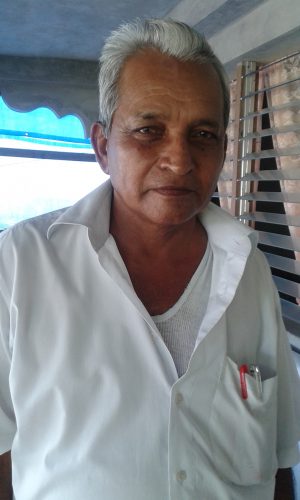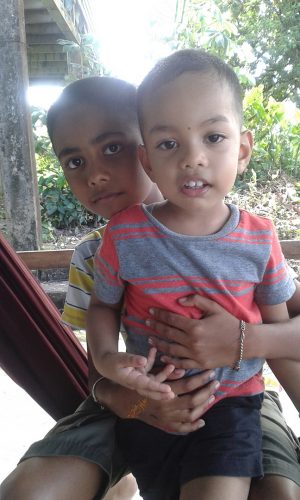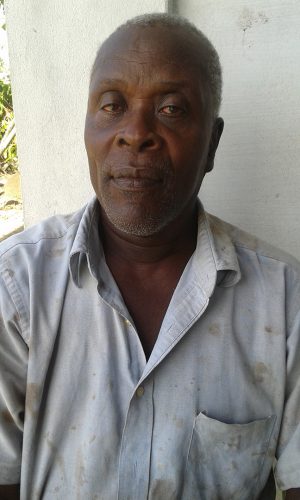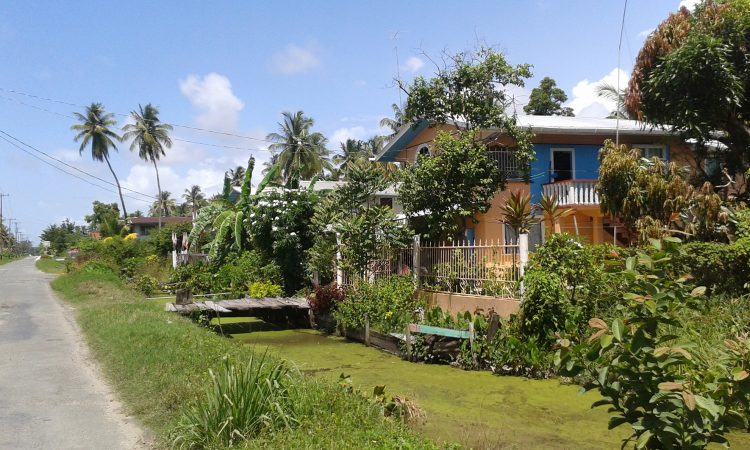Nooitgedacht is a village on Wakenaam Island running parallel to Arthurville, which was featured last week. It’s another small village with a population of just about 120.
The name Nooitgedacht is Dutch in origin and is roughly translated in English to ‘Never Thought’; no one seemed to know how the village, so close to the very English-sounding Arthurville, got its name.
Lynette Rogers or ‘Granny’ as she’s fondly called by the villagers and those who know her, sat across from her daughter in deep conversation when I showed up. All smiles, she offered a warm welcome. Now 76 years old, Rogers was not a native of these parts.
“I am from Ithaca on the West Bank Berbice. My husband [the late Francis Rogers] to be at the time was a surveyor but he surveyed more than the land and married me and bring me here,” she chuckled.
She had visited her in-laws once before their union and travelled the same route when she arrived there the second time as Mrs Rogers. The journey, she said, began by train from Rosignol to Georgetown, where they boarded the steamer (ferryboat) for Vreed-en-Hoop. Once at Vreed-en-Hoop they took a train all the way to Parika where they hopped on to a steamer headed for Leguan. Arriving at Leguan, they took a bus from the front of the island to the back where they were taken by a launch (motorboat) to Wakenaam.
Having been accustomed to seeing the labourers travelling to and from the Blairmont Estate near her home in Berbice, Nooitgedacht seemed dreary to her and it took her a really long time before she adjusted to life there. In fact, more specifically, she had two of her seven children before she stopped missing home as much. By her second child her hands were full with a house and a growing family to take care of and she did not have much time to compare her old home with her new. Whenever she did find the time, once every month, she wrote to her family back in Ithaca. She passed the time easier as well when her mother visited once in a while.
As Rogers spoke, her daughter, a teacher at the Arthurville Primary School who was sitting nearby, listened keenly as her mother told her story, one she seemed to already know as she asked no questions but smiled occasionally. She later left to catch one of the boats leaving for Parika.
Rogers explained that travel on the island comes at differing costs depending on where one is going. However, once a passenger travels with one of the boats working the Parika to Wakenaam route (this doesn’t include the boats working between Supenaam and Wakenaam), they offer each passenger a free bus ride to wherever on the island he/she is headed to. Though this seems a rather nice package, there still remains the concern over the lengthy waiting periods at Parika before a boat is filled.
“I travel only yesterday and I go in the boat 10 o’clock and reach here till one. They got this new turn system now. Most people commenting on the long waiting; sometimes people wait three hours….sometimes people want to come and travel back but they got to wait. The turn system is strenuous,” Rogers said.
This led to her speaking about one of the boat captains, Krishna Singh also known as Krishna Rogers, the son she ‘bought’. Krishna’s mother, she said, had given birth to a son earlier who had died soon after he was born. Wishing that no bad omen befall her second son, she had asked that her neighbour, Rogers, ‘buy’ him from her; this was the common superstition then among women. And so, for a gill (penny) Rogers bought Krishna, picking him up from the dung heap where his mother had left him. Although he grew up in the care of his birth mother, he belonged to Rogers as well and still does to this day.
Living in Nooitgedacht, Rogers said, is sheer pleasure; she grew to love it there. “Nooitgedacht has cooperative people. In fact, the people of the island is very nice; I could go into any home and be welcomed,” she noted.
When her husband passed away in 2005, Rogers said, her relatives—and there are a lot of them with her mother having had eight children and her father a whopping 34—insisted on her returning to Ithaca. But she has grown accustomed to Nooitgedacht and is very comfortable where she is.
Asked whether there was anything that affected her, she replied, “Granny so old, granny don’t tek on.” But she did express the wish that a recreational centre could be built and for a section of it to be dedicated to holding evening classes so that the children of her village can improve on their reading.
On the road, I saw some boys who had just found their ball that had gone missing in the underbrush on one of the empty lots.
Moti Persaud lives a short distance away. Earlier that day I had met with him and his wife at the speedboat jetty at Supenaam and we had travelled together to the island. Though he was ready to head to work, he spared some time to talk.
What he knew was that “The village was bought by ex-slaves from the plantation owners sometime in the 1800s. Some sold [land] to the Indians. My grandfather came to Guyana when he was 11 years old. He would have bought a plot here. I arrived here when I was just six months old from Amersfort [another village on Wakenaam].”
Persaud is a security guard and a Justice of Peace/Commissioner of Oaths. He said he loves the harmonious living that takes place among the villagers.
Growing up, he recalled, his yard was very big and on moonlit nights old people of African ethnicity would congregate there to play games and talk “nancy stories”. During the day, he fondly remembered, he would play with boys his age in the backyard.
Today, he is content. “We have the main commodities here and I’m comfortable. I just want to see better roads and better sea defence….”
Rupert Harry, a vendor, sat at his ‘bottom house’ resting. He buys produce, which he sells at the Parika Market on Fridays and Saturdays. He sells banana, plantain and coconut.
Harry is practically a native of Nooitgedacht as he grew up there, although he was born at the Suddie Hospital. His parents had resided on the Essequibo Coast, but when he was just seven days old, his grandmother took him to live with her at Nooitgedacht.
Harry recalled that the village once has a “Congo dance group” which did African dances and spoke some of the dialects, sometimes right at his downstairs. He was never part of the group but enjoyed looking on. They danced at various places, but mostly at the Maria Johanna Community Centre on Emancipation Day. However, as the members of the group aged and died, so did the tradition; none of the younger villagers had followed in their footsteps.
Harry attended Arthurville Primary, but by age 15 he dropped out to work in the backdam. He later spent two years working at the Labour Exchange Office in Anna Regina.
Every Friday, he takes the ferry to Parika and returns the following day. He had wanted to rent a place in Parika instead of having to go back and forth but rentals are expensive and the travel when compared to rent is much cheaper.
He added that he likes living in Nooitgedacht as the people are nice, though there are a few who get rowdy after a few drinks. He attends the Nooitgedacht Wesleyan Church with his wife who was on an outing at Linden with some of the church members.
“Here is quiet. I don’t think I could live nowhere else but here,” Harry said. “Right now we want better roads. It got some trucks coming from Essequibo [Coast] and they brukking up the road. We want some street lights too; this place does be really dark at nights.”
As I left Harry, I was approached by boat captain Krishna Singh also known as Krishna Rogers. His ‘mom’ Lynette Rogers had called him earlier and so I left the island for Parika from where I would take a minibus back home.
